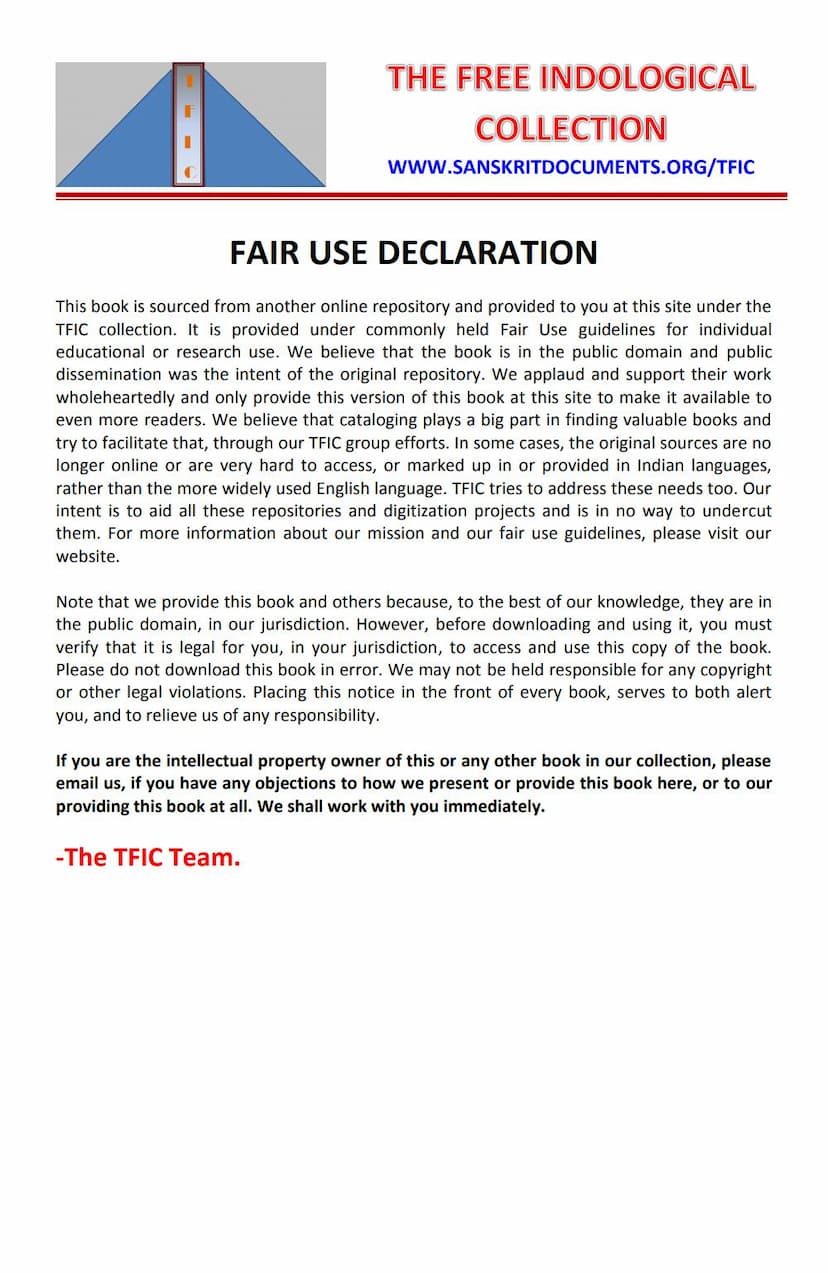Mahavira Prabhunu Aakhyana Athwa Rasa
Added to library: September 2, 2025

Summary
This is a comprehensive summary of "Mahavira Prabhunu Aakhyana athwa Rasa" by Muni Maharaj Shri Ambaji Swami, published by Manikunvar Hakemchand Jetpur.
Book Title: Mahavira Prabhunu Aakhyana athwa Rasa (The Story of Lord Mahavira or Rasa) Author: Muni Maharaj Shri Ambaji Swami Publisher: Manikunvar Hakemchand Jetpur Date: Veer Samvat 2463 / Vikram Samvat 1993
Fair Use Declaration: The book is provided under Fair Use guidelines for individual educational or research purposes, believed to be in the public domain. The TFIC (The Free Indological Collection) team aims to make such valuable books accessible when original sources are difficult to find or in languages other than English.
Dedication: The book is dedicated to the author's pious, kind, and simple-natured mother, Satakmabai, acknowledging her influence in instilling Jain principles and high ideals.
Content and Structure:
The book is primarily a "Rasa," a genre of Jain literature that uses poetry, often set to music and sung in a devotional and narrative style. This particular Rasa focuses on the life story and teachings of Lord Mahavira, the 24th Tirthankara of Jainism.
The structure of the book appears to follow a chronological narrative of Lord Mahavira's life, interwoven with devotional verses. The summaries of the "Dhals" (chapters or sections) provide insights into the key events and themes covered:
- Mangalacharan (Invocation): The book begins with invocations to Jinendra, Siddhas, Acharyas, and other revered figures, as is customary in Jain literature.
- Praise of Lord Mahavira: There are verses praising the divine qualities and grandeur of Lord Mahavira.
- Mahavir Jayanti: A section dedicated to celebrating the birth of Lord Mahavira, likely detailing the auspicious events surrounding his birth.
- Early Life and Descent: The narrative covers Lord Mahavira's conception, birth in the Kshatriya Kund city, and the divine signs and events that accompanied it. This includes the transfer of the divine embryo from Devananda's womb to Trishala's womb by the gods.
- Dreams of Trishala: The text describes the fourteen auspicious dreams that Queen Trishala saw before Mahavira's birth, which are interpreted as prophecies of his future greatness.
- Childhood and Youth: The narrative touches upon Mahavira's upbringing, his princely life, his activities, and the auspicious signs during his childhood.
- Renunciation and Asceticism: A significant portion of the Rasa would detail Lord Mahavira's renunciation of worldly pleasures, his life as an ascetic, and the severe penances he undertook.
- Perishaha (Hardships): The text likely elaborates on the numerous hardships and persecutions (aparigraha, parisaha) Mahavira endured during his twelve years of asceticism, highlighting his unwavering patience, forbearance, and equanimity. These likely include instances of physical abuse, verbal insults, and psychological torment from various individuals and beings.
- Keval Gyan (Omniscience): The attainment of omniscience by Lord Mahavira is a crucial event, marking his enlightenment and his role as a spiritual guide.
- The Chaturvidh Sangha (Four-fold Community): The establishment of the Jain community, comprising monks, nuns, laymen, and laywomen, is likely discussed.
- Mahavir's Teachings: The core of the Rasa would be the dissemination of Lord Mahavira's philosophical and ethical teachings, including the principles of Ahimsa (non-violence), Anekantavada (non-absolutism), and Aparigraha (non-possession).
- Conversion of People: The text would describe how Lord Mahavira's teachings and miraculous powers influenced people from all walks of life, including kings, scholars, and common folk, to embrace Jainism. This includes the conversion of prominent figures like Gautama Swami, the chief disciple.
- Conversion of Gochali and others: Specific narratives about the spiritual journeys and conversions of individuals like Gochali, Shalibhadra, Chandanbala, and others who attained high spiritual states are likely detailed.
- Gau Raksha (Cow Protection): A significant portion of the book, particularly in the later pages, seems to focus on the importance of protecting cows. It highlights their contribution to human life and society and appeals to rulers to uphold this principle. This section includes a piece dedicated to Maharaja Sir Bhagvatsinhji of Gondal for his decree against cow slaughter.
- Confrontation with Misguided Views: The text likely addresses and refutes various heterodox philosophies and incorrect beliefs prevalent at the time, contrasting them with the true Jain doctrine.
- Death (Nirvana): The summary would conclude with Lord Mahavira's attainment of Nirvana, his liberation from the cycle of birth and death, and the subsequent glorification of his spiritual achievements.
- Concluding Verses (Arth): The text likely ends with verses summarizing the essence of Mahavira's life and teachings, encouraging readers to follow the path of righteousness.
Literary Style:
The Rasa is characterized by its poetic verses, likely written in Gujarati, with a devotional tone. The use of different "Dhals" (songs or sections) set to various musical "Ragas" (melodies) would have made it engaging for public recitation and singing in religious gatherings. The language aims to be evocative and inspiring, facilitating spiritual reflection and devotion.
Purpose and Significance:
- Devotional Literature: The primary purpose of this Rasa is to inspire devotion and reverence towards Lord Mahavira.
- Spiritual Education: It serves as a narrative to educate readers about the life, struggles, teachings, and ultimate liberation of Lord Mahavira.
- Moral and Ethical Guidance: The stories and examples within the Rasa aim to impart moral values and ethical principles, promoting a virtuous life according to Jain tenets.
- Cultural Significance: As a Rasa, it represents a significant aspect of Jain devotional and literary tradition, often performed during religious festivals and gatherings.
- Promoting Ahimsa: The emphasis on cow protection underscores the Jain principle of Ahimsa and its application in societal and political spheres.
In essence, "Mahavira Prabhunu Aakhyana athwa Rasa" is a devotional and biographical work that seeks to illuminate the life and profound spiritual legacy of Lord Mahavira through captivating poetry and narrative, encouraging the readers to imbibe his teachings and strive for spiritual liberation.